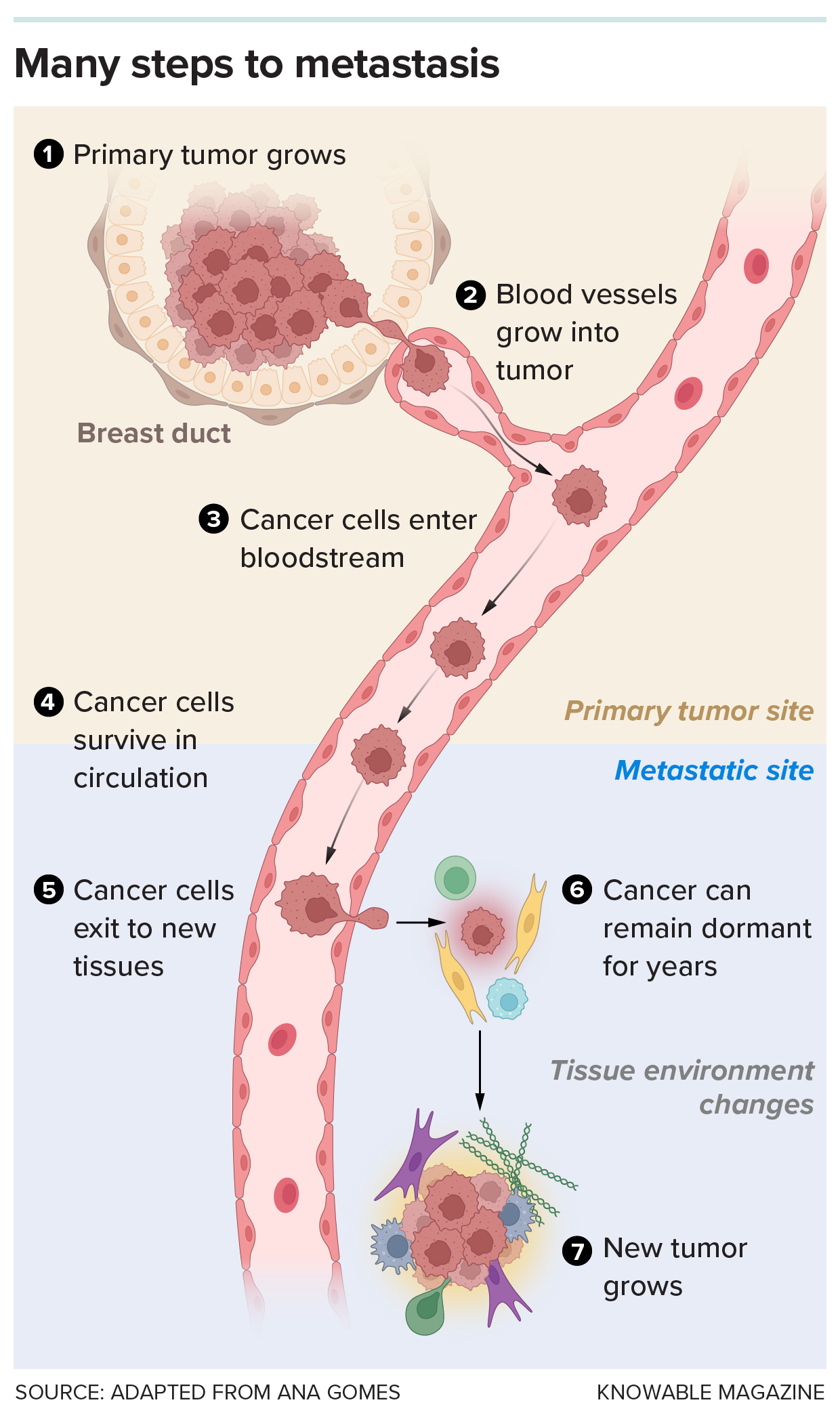Science
Related: About this forumHow cancer cells travel to new tissues and take hold
By Amber Dance 03.27.2025

Back in 2014, a woman with advanced cancer pushed Adrienne Boire’s scientific life in a whole new direction. The cancer, which had begun in the breast, had found its way into the patient’s spinal fluid, rendering the middle-aged mother of two unable to walk. “When did this happen?” she asked from her hospital bed. “Why are the cells growing there?” Why, indeed. Why would cancer cells migrate to the spinal fluid, far from where they’d been birthed, and how did they manage to thrive in a liquid so strikingly poor in nutrients? Boire, a physician-scientist at Memorial Sloan Kettering Cancer Center in New York, decided that those questions deserved answers.
The answers are urgent, because the same thing that happened to Boire’s patient is happening to increasing numbers of cancer patients. As the ability to treat initial, or primary, tumors has improved, people survive early rounds with cancer only to come back years or decades later when the cancer has somehow resettled in a new tissue, such as brain, lung or bone. This is metastatic cancer, and it’s the big killer — while precise numbers are scarce, anywhere from half to the large majority of cancer deaths have been attributed to metastasis. Offering people more options and hope will mean understanding how those cancers successfully migrate and recolonize.
The prevalence of metastasis belies the arduous journey that cancer cells must make to achieve it. A cell that arises in, say, the breast, is well-adapted to live there: to eat the fatty acids available to it, to resist local threats, and to grow there in a solid tumor. If it manages to escape into the bloodstream, it finds itself zipping along at up to 40 centimeters per second with shear stresses sufficient to rip it apart. Should it survive that odyssey and land in a new tissue — say, the brain or spinal fluid — the environment is totally different yet again. The foods the cell is accustomed to may be absent; immune cells or other novel environmental molecules may attack. For a cell to manage this trip, and then adapt to a new environment, is truly a Herculean task.
“It is not easy and trivial,” says Ana Gomes, a cancer biologist at the Moffitt Cancer Center in Tampa, Florida. “It’s just against everything in the nature of these cells.” No wonder that, even though tumors regularly shed cells, most escapees perish or languish without successfully establishing themselves as metastases. “Personally, I think metastasis is an accident,” says Matthew Vander Heiden, a physician-scientist and director of the Koch Institute for Integrative Cancer Research at MIT. “It’s really, really inefficient.” The few cells that manage this epic feat are resilient and flexible in how they feed themselves and process the molecules around them. They may tweak their biochemistry to evade local dangers, or to get the fuel they need in sparse environments. Some even send signals ahead to modify the organ where they’ll land, creating a cushy nest with a food supply ready for when they arrive. “Metabolic changes help these cells to face all this challenge,” says Patricia Altea-Manzano, a biomedical researcher at the Andalusian Molecular Biology and Regenerative Medicine Center in Seville, Spain.
https://knowablemagazine.org/content/article/health-disease/2025/how-cancer-cells-metastasize?
Frasier Balzov
(4,908 posts)walkingman
(10,396 posts)not necessarily cured. After chemo in many cases you have radiation because if there are any "stray cells" that the chemo has not killed they are subject to spreading through your bloodstream.
That is why is it so devastating for a young person to get cancer because the odds of it coming back increase as the year go by even though it might be years.